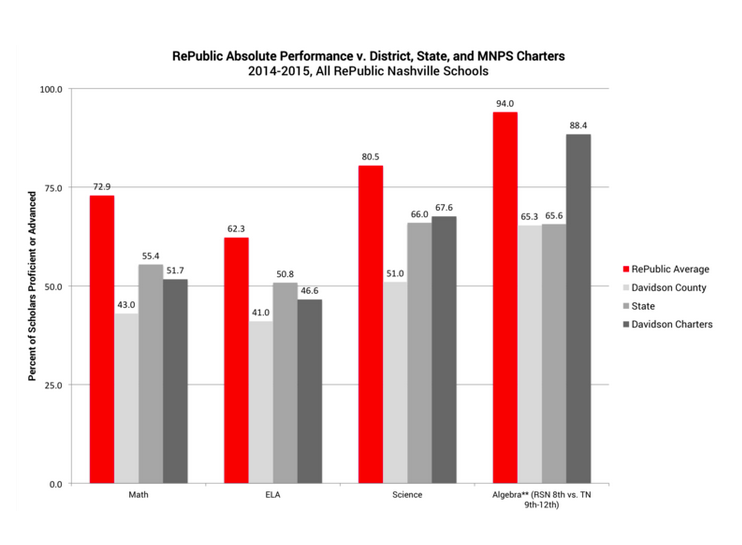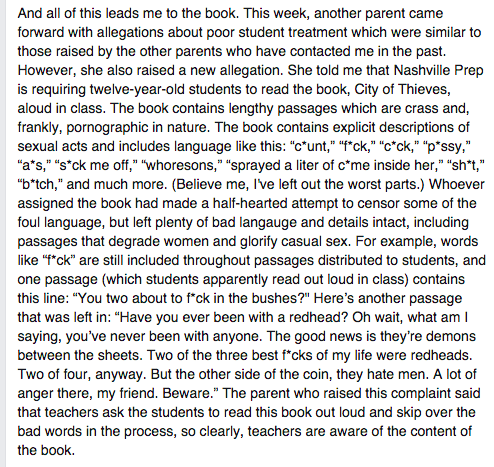The Tennessee State Board of Education today used authority granted to it by the General Assembly in 2014 to approve two KIPP charter schools that had previously been rejected by the MNPS Board of Education.
The decision means the State Board has decided which schools will be opened and funded by MNPS rather than that decision being left to the elected School Board.
The authority was given to the State Board because of the Great Hearts Controversy.
Back in 2012, MNPS rejected an application filed by Great Hearts to open a charter school. The State Board heard an appeal from Great Hearts and sent the issue back to the MNPS Board, recommending approval. MNPS refused. Then-education commissioner Kevin Huffman fined MNPS $3.4 million.
And legislators, ever eager to micro-manage public education to the point of absurdity, filed legislation.
As John noted at the time, a significant part of the legislation is:
This might actually be a better financial deal for charter schools. Under this legislation, a charter school authorized by the state would get the full state, local, and federal share of per-pupil dollars, plus a “local match” from the LEA for capital outlay. The latter portion, especially, may be a change from how things currently work when charters are authorized by an LEA.
Specifically:
(d) Funding for charter schools authorized by the state board shall be in accordance with § 49-13-112, except that the LEA in which the charter school operates shall pay to the department one hundred percent (100%) of the per student share of local funding and any federal funding in the custody of the LEA that is due to the charter school. The department shall withhold from the LEA the per student share of state funding that is due to the charter school as well as any federal funding in the custody of the department that is due to the charter school. The department shall then allocate and disburse these funds to the charter school in accordance with procedures developed by the department.
It will be interesting to see how MNPS reacts to this course of action. The State Board has authorized the expenditure of Nashville tax dollars in a very specific manner, directing that those funds go to support the opening and operation of two KIPP charter schools.
It’s not like MNPS is averse to charter schools. Many charter schools operate in the district and the Board did approve some charter applications this year.
In fact, in 2014, the Board signed off on a plan to give KIPP an elementary school. As Dr. Register proceeded, this action actually led to the formation of East Nashville United.
At that time, the focus of the possible takeover was Inglewood Elementary. NEA President Lily Eskelsen Garcia even visited the school to build support for preventing a KIPP takeover there.
Ultimately, KIPP won the right to takeover Kirkpatrick Elementary.
All of this to say: The majority of the MNPS Board has not demonstrated a bias against charter schools or even KIPP.
Some, including Board Member Will Pinkston, have argued for smart growth when it comes to charters. Pinkston noted:
The school board took a fiscally conservative position. With 8,157 seats currently in the charter pipeline — including more than 1,000 yet-to-be-filed seats belonging to KIPP — that’s a total future annual cash outlay of $77.5 million.
What KIPP wants to do — expand the pipeline to more than 9,000 seats — would take our future annual cash outlays up to $85.5 million. None of this includes the $73 million in annual cash outlays for charter seats that already exist.
Pinkton’s argument and other analysis suggesting that charter schools do place a burden on the MNPS budget prompted Board Member Mary Pierce to respond with a straw man argument about the cost of closing all current metro charter schools.
The fact is, MNPS hasn’t been in the business of closing charter schools — they’ve been approving new charter applications nearly every year and have many more charter seats opening. It seems likely that the KIPP charter schools approved by the State Board today would have ultimately won MNPS Board approval. But today, the State Board of Education decided they knew better than Nashville’s School Board when and how many charter schools should be opened in Nashville. They also obligated funds, including local funds, to the opening and operation of these schools.
One final note: The State Board now is accountable for the oversight and monitoring of the two KIPP schools it approved in Nashville:
Except as provided in subdivision (b)(3), oversight and monitoring of
charter schools authorized by the state board of education shall be performed by the state board. As requested, the department of education shall assist the state board with general oversight of any charter school authorized by the state board. (Public Chapter 850, 2014).
What happens next? Stay tuned…
For more on education politics and policy in Tennessee, follow @TNEdReport



